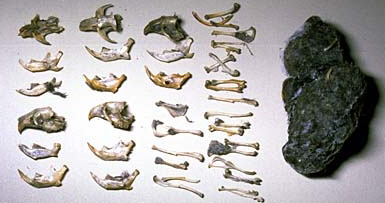Questions 1,3,5 review
1. Based upon the class data, rank the most frequently consumed prey for the class "owl population".
Most frequently consumed prey was known as rat in 7A. The percentage of owl biomass which owl consumed was bit over 40% (42% according to our data). After finding the percentage of owl pellets or the biomass, we knew that rat was one of favorites to owls. But according to our graph, the amount of rat we founded were less than birds, mice, and voles. I recorded that birds, mice, and voles surpassed in amounts than rats however comparing with the mass we know that rat has an advantage.
3. A predator expends energy when hunting for food. Which is the more " energy expensive" cuisine, 35 insects at 1g each or one 35 g vole?
The question is actually the matter to the answer, depending on what my minds says I think it will be better for the predator to obtain a vole rather than using up all their energy to find something. Consuming both of the preys will be like consuming the same amount of energy. Since predator "owl" can't synchronize catching insects at the same time the predator has to consume more energies to catch one insect by one. Nevertheless, finding a vole near by (maybe) will be a nimble idea. Although insects are easy to find, catching a vole in the environment will be efficient. Therefore, the owl should rather search for a vole for their meal instead of wasting time to catch insects 1 by1.
5. Based upon your data, suppose the shrew population seriously declined. Would it affect the areas owl population?
According to the class's data, shrew only dominated 1% of the pie chart/ the biomass of owl's. I am not sure if other predators prefer shrews since owls didn't seem to like shrews or maybe shrews were rare to catch. However if other predators or owls didn't prefer shrews, it wouldn't matter if the shrew population shrinks because the preys owl usually obtains/consumes are either rats or vole (sometimes mice). So as concluding, owls wouldn't start wandering because of disappearance of shrew population.
Short Reflection:
First when the assignment was assigned to our group I had no idea what to do and also our group mates (Luka, Jan). But as we start discovering the biomass and the left preys of animals we soon found the principal of the assignment. This lab/experiment was bit gross however it was an experience which I don't think I will take a try again. It was a short lab, bit unclear, though it was done in short term the lab was very full of enthusiasm.





No comments:
Post a Comment